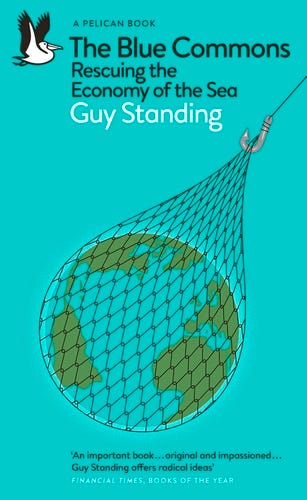Reflections on Blue Commons: Rescuing the economy of the sea by Guy Standing
My thoughts on a new book by Guy Standing and some other writers at the Oxford Literary Festival.
Guy Standing is a pretty amazing person.
Have you heard of him? He's an economist / activist / author who has been campaigning for a universal Basic Income for decades now. A guaranteed living wage for everyone, no matter what they do or don’t do. It’s a controversial concept.
And to add a bit of glamour, he lives in Geneva… which I think is a pretty cool place for an economist to live.
Does he have a Swiss bank account? I imagine so. He lives there. And Geneva is at the other end of the lake from Vevey, where Charlie Chaplin lived and died when America fell out of love with him. If it’s good enough for Charlie….
Guy Standing makes an incredibly compelling argument in his book, 'Basic Income'.
Last week I went to see him talk at the Oxford Literary Festival - now sponsored by Netflix, which makes an interesting institutional / corporate partnership between books and TV. Their common bond is storytelling, apparently. I think it's probably cash to be honest... one paying, one taking.
But when it comes to taking financial support, strange bedfellows are nothing new to Oxford institutions - I'm looking at you, Saïd, Mosley, Blavatnik et al...
But I digress.
Guy Standing has produced another superbly conceived book called Blue Commons. And in his own, incredibly unique oratory style, he walked us through some of the highlights of this impressively complex exploration into the simplest of questions, 'Who owns the ocean?'.
Since the establishment of United Nations Convention on the Law of the Sea (UNCLOS), any country with a coastline gets the economic rights and responsibilities for adjacent waters going out 200 nautical miles (about 230 landlubber miles…)
If you've got lots of shoreline, you've won the lottery. Landlocked and you're pretty much bust.
I learned that our UK monarchy managed to score the rights to all of Britain's sea beds, worth a pretty penny when you start dealing in offshore wind and sea sand drilling... they've already auctioned off half a dozen plots at a tidy profit for the Crown Estate.
Scotland's famous salmon farms are stocked with Norwegian fish... how very disappointing for authentic lox lovers.
Overall, the story is this: what belongs to all of us has been 'enclosed' by institutions who exploit the environment and economic wellbeing of our oceans and do not equally share out the dividends.
When you follow the money, you find the power. And the power to keep our oceans safe and abundant has been taken into the hands of governments who sell off rights to corporations who care about share value, not fair sharing.
I loved watching and listening to him speaking. It felt like an impassioned political statement, backed up with so much research, insight and rigour. He told us he'd been presenting his argument to the House of Commons the night before. Not surprising.
So aside from the slightly squiffy sponsorships, I'm grateful to the Oxford Literary Festival.
This year I've seen a couple of real heavyweights, including the outstanding physicist Carlo Rovelli talking about Anaximander, the orginal philosopher who nobody seems to know. Dave Rich also spoke about his brave new book, Everyday Hate on antisemitism, a subject that I've found people of all political persuasions want to ignore, diminish or dismiss all my life. We saw the marvellous Nick Wallis talking about his book ‘The Great Post Office Scandal’ which tells the shocking story of the fight to expose a multimillion pound IT disaster and coverup which put innocent people in jail.
Literary festivals are a funny thing. I've been a writer all my life and I find them incredibly inscrutable and unwelcoming. Hard to navigate, expensive to attend and fairly dry, academic, institutional and intimidating...
You have to search, find, then book and pay to see each individual speaker. It’s hard to plan out your time. Everyone seems more bookish, more published, more posh, more polished than you. Or me.
It doesn’t have to be that way. Once you pass through the various thorny gates of the festival’s infrastructure, the riches can be incredible - amazing authors, in the flesh, talking about their work, reading out parts of their books, being nice to people, then selling and signing copies at the end (always feel a bit of a mug queuing up for a signed book, but still do it once in a while…)
Here’s my free branding / operational advice to ALL literary festivals that wish to attract more people to their events:
Instead of selling one ticket per each author event, offer day tickets / whole festival tickets / carnet passes (1 pass, 10 events, like the Paris Metro) / Premium passes for the whole shebang…
Look at how music festivals show their lineups of artists for each day - make it easy on your audience to see who’s on when
Every talk is a YouTube video / TED talk / podcast episode. Record, distribute, repeat. Grow your global audience beyond the event.
Have more fun. Create themes. Connect concepts. Galvanise your audiences and your authors. I think Hay Festival does a bit of this - with added music, but I’ve always been too confused by their programme to go.
However, I went to Kite Festival last summer. Check it out. Music, literature and ideas festival. All in one place, for one ticket, with something pretty much for everyone.
I know this is a kind of review post. Not my own original material. I won’t apologise for this. But can’t imagine I’ll do a lot of these…
Thanks for reading. Please share if you like. Mike

